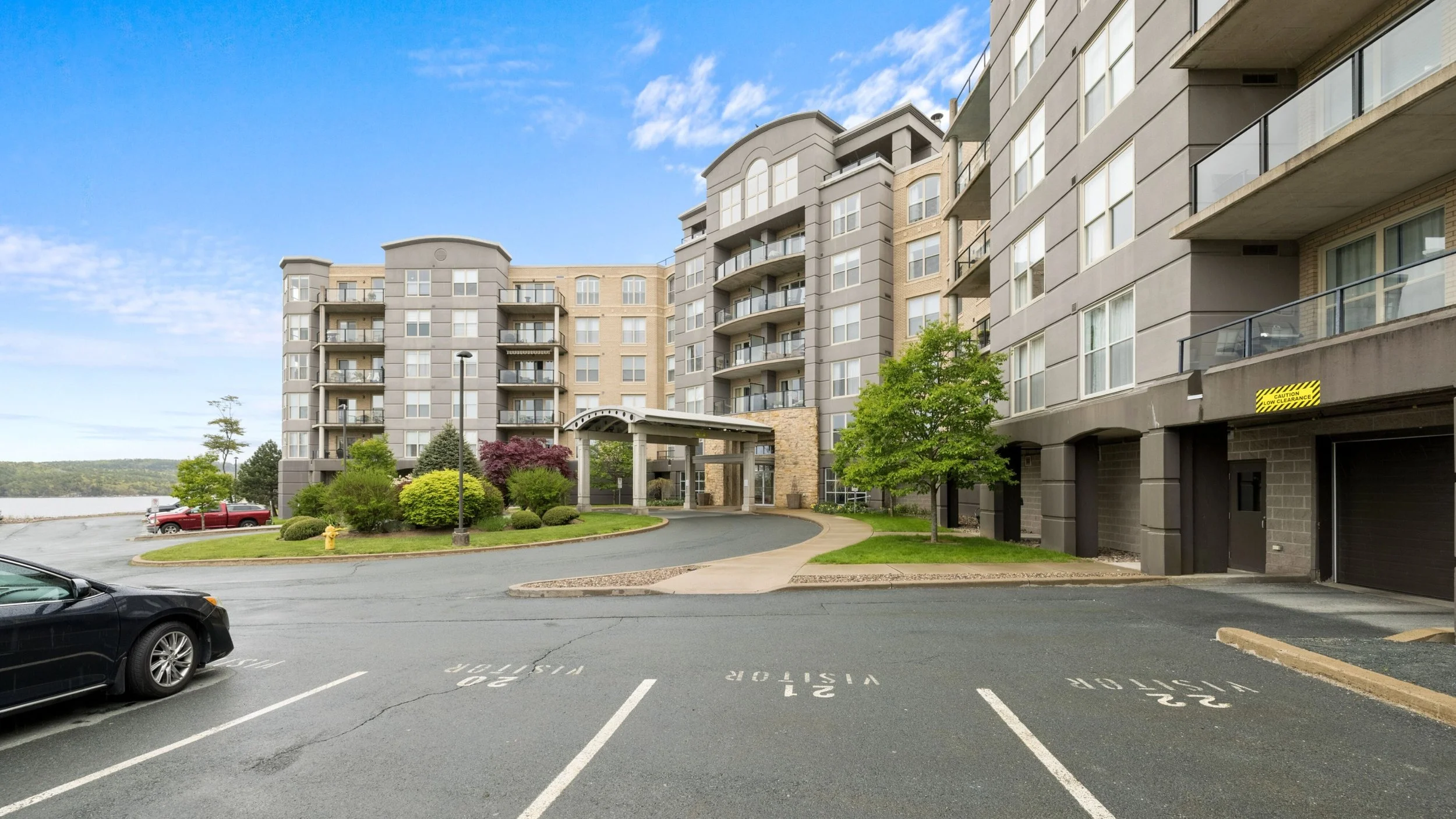Are you planning to buy a Halifax Condo? Request our FREE Halifax Condo Buyer’s Guide for all the information you need to set yourself up for success!
It’s no secret that Halifax Condo living has its perks: less maintenance, added amenities, increased security and more.
More and more we see Halifax residents catching on to these benefits, and broadening their property search to include condos. We expect this to only increase with Halifax’s population growth.
Condominiums are, in our opinion, one of the best types of property to own in Halifax. Now, this doesn’t mean we suggest you buy into just any Halifax Condo building. You should understand that condos run like a corporation, and condo buildings cannot fail.
What do we mean by saying, they cannot fail?
We mean, if the roof needs replacing, it will be replaced. If a pipe bursts and causes damage, repairs must happen. And in these cases, the money for these repairs can come from two places:
The reserve fund that you as an owner contribute to monthly (via your condo fees)
If there are not enough reserves in the reserve fund, it comes out of owners’ pockets through a special assessment.
This is one of the biggest concerns Halifax Condo buyers come to us with. They are worried their condo fees will increase dramatically due to a building repair.
While we do not have a crystal ball to predict your building's future repairs, we do understand condo documents thoroughly and know the questions to ask to ensure you are buying into a secure and sound condo corporation.
Buying into a secure and sound corporation = less chance of special assessments, and less chance of dramatic increases in condo fees.
Read through to equip yourself with 8 essential questions you must ask before you purchase a Halifax Condo to set yourself up for success.
Aqua Vista - 67 Kings Wharf Place, Dartmouth, NS - Photography: Trevor Kennedy
1. Does the declaration prohibit any particular occupation or use of the units?
Common examples are the prohibition of pets and of conducting business from the unit. Time and time again, Halifax buyers come to us interested in purchasing a condo for Airbnb purposes, and we have to break the bad news to them: the majority of condo buildings in Halifax do not allow Airbnb, and the ones that still do are in the process of phasing it out. Condo buildings are typically ok with long-term renters, but most buildings are not comfortable with multiple, new, short-term residents coming and going.
Some condo buildings also have restrictions on what kind (if any) businesses can be run from their units, and what kind of pets owners are allowed to have.
Domvista - 267 Gary Martin Drive, Bedford NS - Photography: Trevor Kennedy
2. Is the project registered as a condominium corporation? If not, when is registration anticipated?
This only applies to brand new buildings. Sometimes, there is an interim phase in which the condo building is being registered as a corporation, and owners begin to move in. If a new builder allows for occupation before registration, you may be subject to an interim occupancy fee. The fee can be made up of three parts: interest on the unpaid balance of the purchase price of your condo, an estimate on the municipal taxes for your unit, and a projected common expense contribution to keep the building running. The fee is usually charged monthly and requested in the form of post-dated cheques made out to the developer or vendor. This does not always occur, and new condo buildings are rare nowadays in Halifax, so most buyers will not have to think about this, however, it is worth noting if you are moving into a brand new building before it is registered.
It’s good to note, that developers cannot force you to move into the building before condo registration. Moving in early can be given as an option, but is not mandatory. If you wish to avoid these fees, you can wait to move in until registration is complete.
The Tides - 36 Southgate Drive, Bedford NS - Photography: Trevor Kennedy
3. How many of the units are owner-occupied versus rented?
Knowing what percentage of a building is being rented can give you insight into the community atmosphere of the building. Generally, renters take a shorter-term perspective on issues that can affect condo living, versus owners who live in the building, who may see things more long-term. Renters are also less likely to conduct regular maintenance in their units in comparison to owners.
Condo buildings in Halifax that are close to universities typically have large numbers of renters, as opposed to condo buildings in, for example, Bedford. It’s not to say having a building with a lot of renters is always a bad thing: If you are looking for a condo as an investment opportunity, you may want a building that has many renters as it may be easier to find a tenant.
Knowing the percentage of renters in a condo building you are interested in is good knowledge to have to evaluate whether you may want to purchase. Most buildings with professional property management will have this information available, whereas, in smaller buildings that are not professionally managed, it may be harder to find out.
4. If the unit is presently occupied by a tenant, how much notice to quit is required by the Residential Tenancies Act?
If you are purchasing a condo that is tenant occupied in Halifax, you have a few options:
If you are moving into the unit and the tenant is on a periodic lease, then the owner must give the notice to quit with a move-out date no earlier than 2 months after the date the tenant receives the notice.
If you are moving into the unit and the tenant is on a fixed-term lease, the seller must give the notice to quit with a move-out date no earlier than the date specified on the lease as the end of tenancy
If you are purchasing an investment condo with a tenant that has a periodic lease, you cannot evict the tenant unless they do not adhere to the lease agreement.
If you are purchasing an investment condo with a tenant that has a fixed lease, you can choose to not renew the tenant’s lease when the fixed end of tenancy date arrives.
5254 Green Street, Halifax, NS - Photography: Trevor Kennedy
5. Has a reserve fund study been conducted? Is the corporation's budget and financial status in keeping with the recommendations of the study?
The financial status and reserve fund are very important factors for owners in a condo building. Essentially, your condo corporation should be taking a percentage of your monthly condo fees and contributing those to a reserve fund for when (not if) repairs need to be made.
If the condo corporation is not following suit with the recommendations of a reserve fund study, and a large repair needs to be made, your condo fees may increase substantially, or a special assessment will need to be done. Either way, it would be unexpected money out of your pocket.
Falcon Ridge - 277 Rutledge Street, Bedford NS - Photography: Trevor Kennedy
6. Are any major renovations or repairs anticipated?
This question coincides with question #5: If there are major repairs anticipated, where is the money coming from for them? Does the building have ample reserve funds to cover the costs? Repairs will inevitably happen at some point in every Halifax Condo building, so it’s crucial to understand how prepared your condo corporation is to handle this.
Artillery Place - 5530 Artillery Place, Halifax NS - Photography: Trevor Kennedy
7. How much are the condo fees? What expenses do they cover?
Some condo newbies are shocked to hear that condos require a monthly condo fee on top of their common living expenses. Condo fees typically cover maintenance of the building, landscaping, snow removal, common areas and amenities. Understanding what your condo fees cover can help you budget what you can afford. Some Halifax condo buildings include heat, hot water, or even property taxes in their monthly fees. If these fees are not paid, a lien can be issued against the condo owner.
The Greystones - 1457 Brenton Street, Halifax NS - Photography: Trevor Kennedy
8. Is the corporation self-managed or managed by a professional management company?
Generally speaking, in Halifax, large buildings are almost always professionally managed, whereas small condo buildings may or may not be. It’s always a bonus when a condo building is professionally managed, as the condo board does not get burned out, and the professional management has access to things like full-time superintendents, additional staff and are experts in building laws and regulations.
Knowing the answers to these questions before deciding if you are going to purchase a condo in a given building will help you form a solid picture of whether this building is for you. As condo experts, we understand condo documents through and through and can help you navigate these and other questions before purchasing. The more informed you are, the greater the chance of a successful purchase.
Ready to purchase a Halifax Condo?
Jordan Gunn
Licensed Real Estate Assistant
Keller Williams Select Realty
902-401-0373

































![[Pictured here is me and my mom!]](https://images.squarespace-cdn.com/content/v1/5845846215d5dbb7090d62a6/1619706764957-K3F2FJ8MJZ59JRNZKKJG/1601618_39956022_f.png)






















































